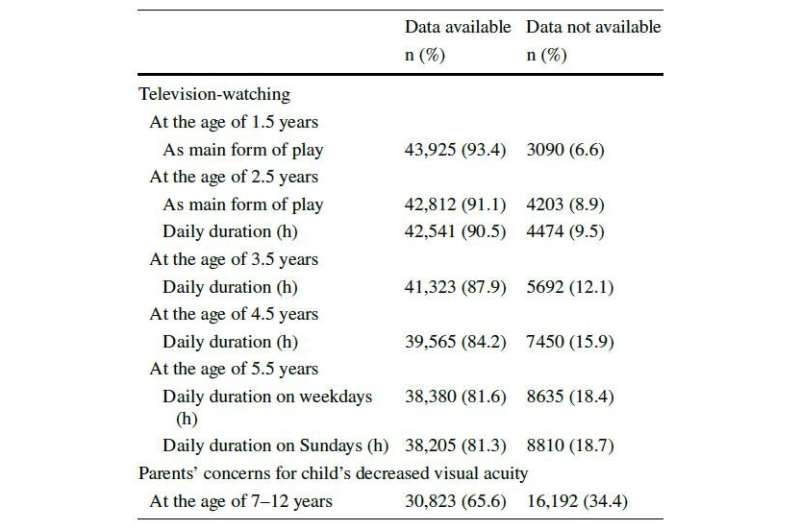High levels of television exposure affect visual acuity in children

It is ingrained in parents to curtail the hours their children spend in front of the television. Anecdotal evidence suggests that prolonged viewing of television and use of smart gadgets during early years can adversely affect a child's eyesight and behavioral development. However, there is little scientific evidence to support such observations on the effects of excessive television exposure on children's visual acuity. Now, Professor Matsuo Toshihiko (M.D., Ph.D.) and Professor Yorifuji Takashi (M.D., Ph.D.) from Okayama University describe how such exposure can indeed have detrimental effects on children's eyesight during later years.
The researchers used a national database of the Japan Government, based on the annual survey of all children born in the certain period of the year 2001. In 47,015 eligible children from the database over time, watching television or videos as a primary form of "play" and also daily duration of television-watching were assessed in the earlier years of life. The same children at elementary school were assessed yearly from the ages of 7 to 12 years to measure any concerns about visual acuity raised by their parents.
The Okayama University team first observed that if children had high television exposure at the ages of 1.5 years or 2.5 years, parents showed significant concerns around their children's eyesight in the second half of the study. This observation was consistent for children of both sexes and did not change based on parameters such as residential area or parents' education. Deeper analysis showed parents of children aged 2.5 years who watched television for greater than or equal to 2 hours/day had much greater concern for their children's visual acuity compared to those of children who watched television for up to 1 hour daily. However, as a child's age increased, their parent's concern during later years decreased.

To ensure uniformity of the results, the researchers re-analyzed the responses of a smaller pool of participants—those who participated in all surveys conducted when the children were between 7 to 12 years of age. Not only did the responses from this group reiterate their primary findings, but it was also found that the proportion of concerned parents increased as the children aged from 7 to 12 years. Visual acuity seems likely to deteriorate with age.
"This nationwide population-based longitudinal study is the first to demonstrate that television-watching only in the earlier years of life, but not in the later years, leads to the later consequence of visual acuity problems at elementary school age," conclude Professor Matsuo Toshihiko and Professor Yorifuji Takashi.
Hence, carefully monitoring a child's television exposure up to the age of three could be a critical factor in healthy eyesight development. The research suggests that younger children should be encouraged to try more traditional ways of playing.
More information: Toshihiko Matsuo et al, Television-watching in the early years of life and the association with parents' concerns about decreased visual acuity in their elementary school-aged child: results of a nationwide population-based longitudinal survey of Japan, Japanese Journal of Ophthalmology (2021). DOI: 10.1007/s10384-021-00831-x





















